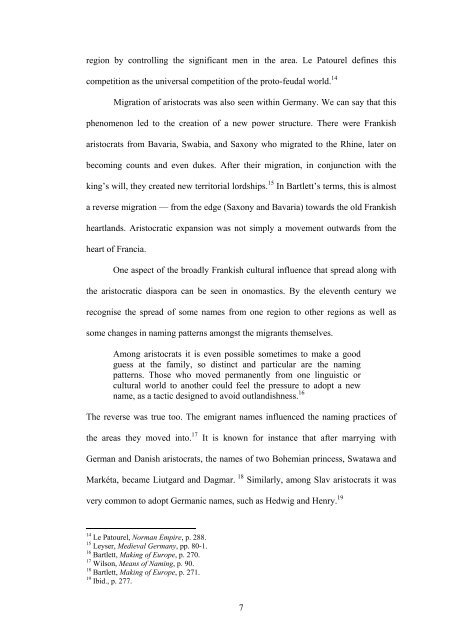I certify that I have read this thesis and have ... - Bilkent University
I certify that I have read this thesis and have ... - Bilkent University
I certify that I have read this thesis and have ... - Bilkent University
You also want an ePaper? Increase the reach of your titles
YUMPU automatically turns print PDFs into web optimized ePapers that Google loves.
egion by controlling the significant men in the area. Le Patourel defines <strong>this</strong><br />
competition as the universal competition of the proto-feudal world. 14<br />
Migration of aristocrats was also seen within Germany. We can say <strong>that</strong> <strong>this</strong><br />
phenomenon led to the creation of a new power structure. There were Frankish<br />
aristocrats from Bavaria, Swabia, <strong>and</strong> Saxony who migrated to the Rhine, later on<br />
becoming counts <strong>and</strong> even dukes. After their migration, in conjunction with the<br />
king’s will, they created new territorial lordships. 15 In Bartlett’s terms, <strong>this</strong> is almost<br />
a reverse migration — from the edge (Saxony <strong>and</strong> Bavaria) towards the old Frankish<br />
heartl<strong>and</strong>s. Aristocratic expansion was not simply a movement outwards from the<br />
heart of Francia.<br />
One aspect of the broadly Frankish cultural influence <strong>that</strong> sp<strong>read</strong> along with<br />
the aristocratic diaspora can be seen in onomastics. By the eleventh century we<br />
recognise the sp<strong>read</strong> of some names from one region to other regions as well as<br />
some changes in naming patterns amongst the migrants themselves.<br />
Among aristocrats it is even possible sometimes to make a good<br />
guess at the family, so distinct <strong>and</strong> particular are the naming<br />
patterns. Those who moved permanently from one linguistic or<br />
cultural world to another could feel the pressure to adopt a new<br />
name, as a tactic designed to avoid outl<strong>and</strong>ishness. 16<br />
The reverse was true too. The emigrant names influenced the naming practices of<br />
the areas they moved into. 17 It is known for instance <strong>that</strong> after marrying with<br />
German <strong>and</strong> Danish aristocrats, the names of two Bohemian princess, Swatawa <strong>and</strong><br />
Markéta, became Liutgard <strong>and</strong> Dagmar. 18 Similarly, among Slav aristocrats it was<br />
very common to adopt Germanic names, such as Hedwig <strong>and</strong> Henry. 19<br />
14 Le Patourel, Norman Empire, p. 288.<br />
15 Leyser, Medieval Germany, pp. 80-1.<br />
16 Bartlett, Making of Europe, p. 270.<br />
17 Wilson, Means of Naming, p. 90.<br />
18 Bartlett, Making of Europe, p. 271.<br />
19 Ibid., p. 277.<br />
7
















